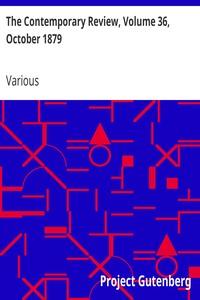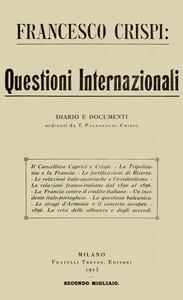|
|
Read this ebook for free! No credit card needed, absolutely nothing to pay.Words: 101220 in 17 pages
This is an ebook sharing website. You can read the uploaded ebooks for free here. No credit cards needed, nothing to pay. If you want to own a digital copy of the ebook, or want to read offline with your favorite ebook-reader, then you can choose to buy and download the ebook.

: The Contemporary Review Volume 36 October 1879 by Various - Political science Periodicals; Arts Periodicals; Literature Periodicals The Contemporary Review@FreeBooksWed 07 Jun, 2023 Contemporary Books:-- INDIA AND AFGHANISTAN. But if Lord Lytton's treatment of the Ameer was cruel and ungenerous, criminal, at least to an equal extent, was his treatment of the people over whom he ruled. At that time there was an appalling amount of suffering all over India. The country had been ravaged by a series of famines. In the Punjab prices were abnormally high. The North-West Provinces were still unrecovered from a dearth, during which the Government of India had exhibited a rapacity and indifference to human suffering which would, with difficulty, be credited in England. Terrible as is the mortality resulting from a famine in India, the death-roll represents but a tenth part of the suffering which such visitations inflict. For every human being that dies, ten are left, without money and without physical strength, to struggle feebly for existence on the margin of the grave. They cannot give a fair day's work for a fair day's wage. They may reckon themselves fortunate if their enfeebled powers can earn just sufficient to keep body and soul together. For all these wretched beings--and last year in Upper India they numbered many millions--the smallest rise of price in the necessities of life means death from hunger. A war, therefore, with the enormous rise of prices which it would immediately produce, was nothing less than a sentence of torture and death passed upon tens of thousands of our own subjects. Undeterred, however, by the warnings of experience, deaf to considerations of humanity and justice, the Government of India started on its wild-goose chase after a "Scientific Frontier." The victims whom it trampled to death in this mad chase have never been numbered--they never can be numbered. The Afghans who died in defence of their village homes form but a hundredth part of them. The residue was composed of our own mute and uncomplaining subjects. A failure in policy more signal and more complete than this it is impossible to imagine. But it is to be noted that the Ministerial journals are doing their utmost to save the "Scientific Frontier" from the destruction which has overtaken the projects of the Ministry. And so long as a belief in this Frontier is cherished anywhere, the return to a safe and rational policy is obstructed. In the following pages, therefore, I shall, firstly, endeavour to show that the "Scientific Frontier" is as purely fictitious as the "strong, friendly, and independent Afghanistan" which we were told had been created out of chaos by means of the war. And, secondly, I shall discuss the various lines of conduct which lie open to us, when we have occupied Kabul, in order to determine which is best fitted to ensure the stability of our Indian Empire and the contentment of its inhabitants. The Scientific Frontier. In all the discussions on this Frontier question, a very obvious, but all-important, fact has been persistently forgotten. It is that British rule in India is a rule based upon military supremacy; and that, therefore, our Indian army--English as well as native--is primarily a garrison, having its duties upon the places where it is quartered. We could not withdraw our troops from any part of India without incurring the risk of an outbreak in the districts thus denuded. The "Punjab Frontier Force" has always been a force distinct from the "Army of India," and recognized as having special duties of its own. So far as I know, in the discussions on a "Scientific Frontier" no reference has been made to the above circumstance. The Indian army has been spoken of as if it were so much fighting power, which we were free to concentrate at any point we pleased. And to this oversight is due the hallucination that an improved frontier would enable us to diminish the strength of the Indian garrison . The fact is, that before this last war we had almost the very frontier which our situation in India required. If the authority of the Ameer had extended up to the boundaries of our Empire, troubles between the two States must have occurred, resulting inevitably in the extinction of the weaker. The evil of such an extension of territory no one denies; we should not only have had to hold Afghanistan with a strong garrison--certainly not less than twenty thousand men--but we should have been compelled to maintain a frontier force, to guard against aggression from without, either from Russia or Persia. Forty thousand men would have been needed for this double duty, in addition to the pre-existing garrison of India. But by a piece of supreme good fortune the authority of the Ameer did not begin where ours left off. Between us and him were interposed the tribes which dwell in the hills along our North-Western frontier. These tribes acknowledged allegiance neither to him nor to us. Broken up and divided amongst themselves, the worst they could inflict upon us was an occasional raid into our territories; and these we could repress without having to call the Ameer to an account for the lawlessness of his subjects. A few regiments of horse and foot were all that we needed for the defence of our frontier; while as against foreign invasion we possessed a frontier that needed no defence at all. That frontier consisted of the foodless deserts and inaccessible hills of Afghanistan. These were impenetrable to an invader, so long as we retained the friendship and the confidence of the people who dwell among them. Consequently, to quote the language of Sir Henry Rawlinson, "our main object has ever been, since the date of Lord Auckland's famous Simla Manifesto of 1838, to obtain the establishment of a strong, friendly, and independent Power on the North-Western frontier of India, without, however, accepting any crushing liabilities in return." We all know the manner in which Lord Auckland set about obtaining the "strong, friendly, and independent Power," and the "crushing liabilities" we had to accept in consequence. Tutored by experience, we adopted a wiser and more righteous policy, which was producing admirable results. The difficulty of establishing a stable friendship with Afghanistan arises from the character of the people. It is the habitation, not of a nation, but of a collection of tribes, and the nominal ruler of Afghanistan is never more than the ruler of a party which, for the time, chances to be strongest. Consequently there never existed an authority, recognized as legitimate throughout the country, with which we could enter into diplomatic relations. At the same time, their divided condition crippled the Afghans for all offensive purposes. We had, therefore, nothing to fear in the way of unprovoked aggression, and our obvious policy was to win the confidence of these wild tribes and their chiefs, by carefully abstaining from encroachments on their independence. Such, in fact, has been the policy which every Governor-General has pursued in the interval which divides the "plundering and blundering" of Lord Auckland from the like achievements of Lord Lytton. And it had been attended with the greater success, because under the firm guidance of two remarkable men, Afghanistan had progressed considerably towards the status of an organized kingdom. Shere Ali had diligently trod in the footsteps of his father, the Dost, and it is in these terms that the Government of India describes the rule and policy of the Ameer in the year 1876: This "strong, friendly, and independent Power"--this edifice of order and increasing stability--the British Government deliberately destroyed in the insane expectation of finding a "Scientific Frontier" hidden somewhere in the ruins. It is difficult to conceive of an action more impolitic or more cruel. In a month the labours of forty years were obliterated, old hatreds rekindled, and the wounds of 1838, which the wise and gentle treatment of former Viceroys had almost healed, were opened afresh. "The Indian Government are most anxious to avoid adopting any policy which would bear even the semblance of hostility towards Russia, but the extreme probability of a collision sooner or later cannot be overlooked. It is necessary, therefore, to provide for a strong defensive position to guard against eventualities. From this point of view it is indispensable that we should possess a commanding influence over the triangle of territory formed on the map by Kabul, Ghuznee, and Jellalabad, together with power over the Hindoo Khosh.... This triangle we may hope to command with Afghan concurrence if the Ameer is friendly. The strongest frontier line which could be adopted would be along the Hindoo Khosh, from Pamir to Bamian, thence to the south by the Helmund, Girishk, and Kandahar, to the Arabian Sea. It is possible, therefore, that by friendly negotiations some such defensive boundary may be adopted." It is impossible not to admire the hardihood of this remarkable correspondent when he alleges that the war was "entirely against our will, and all our endeavours to avoid it." But this is not the matter with which I am at present concerned. The official character of these communications will be denied by no one, and they make it clear that the "Scientific Frontier" was intended as a barrier against Russia, and would have made the Hindoo Khosh the external boundary of the Indian Empire. Such a frontier is manifestly the dream of a military specialist, to whose mental vision the Indian Empire, with all its diverse interests, has no existence except as a frontier to be defended against the Russians. And it illustrates the ignorance and precipitate folly which has plunged us in our present difficulties that a project so wild should have been seriously entertained. To have carried it out the subjugation of Afghanistan would have been an indispensable preliminary, and then the civilizing of it, by means of a system of roads and strong garrisons throughout the country; the entire cost of these vast operations being defrayed by a country already taxed to the last point of endurance, heavily burdened with an increasing debt, and ravaged by periodical famines. Such, however, was the "Scientific Frontier" for which a "specially gifted Viceroy," trained in "the highest order of political statecraft," declared war against the Ameer. But the frontier which we obtained at the close of the war, and which Ministers and Ministerial journals would have us believe is the genuine article which they wanted from the beginning, is not only not this frontier, but it has not the smallest resemblance to it. And what is implied in detaching Persia from Russia he explains in another part of his Essay. "If Russia, as there is strong reason to believe, is now pushing on to Merv or Sarakhs ... with the ultimate hope of occupying Herat, then it might very possibly be a sound policy to extend to Persia the provisions of the Asia Minor Protectorate, or even to support her actively in vindicating her rights upon the frontier of Khorass?n." Free books android app tbrJar TBR JAR Read Free books online gutenberg More posts by @FreeBooks
: A History of the Inquisition of the Middle Ages; volume II by Lea Henry Charles - Inquisition History@FreeBooksWed 07 Jun, 2023

: My Mission to London 1912-1914 by Lichnowsky Karl Max F Rst Von Murray Gilbert Author Of Introduction Etc - World War 1914-1918 Causes; Great Britain Foreign relations Germany; Germany Foreign relations Great Britain@FreeBooksWed 07 Jun, 2023
|
Terms of Use Stock Market News! © gutenberg.org.in2025 All Rights reserved.






